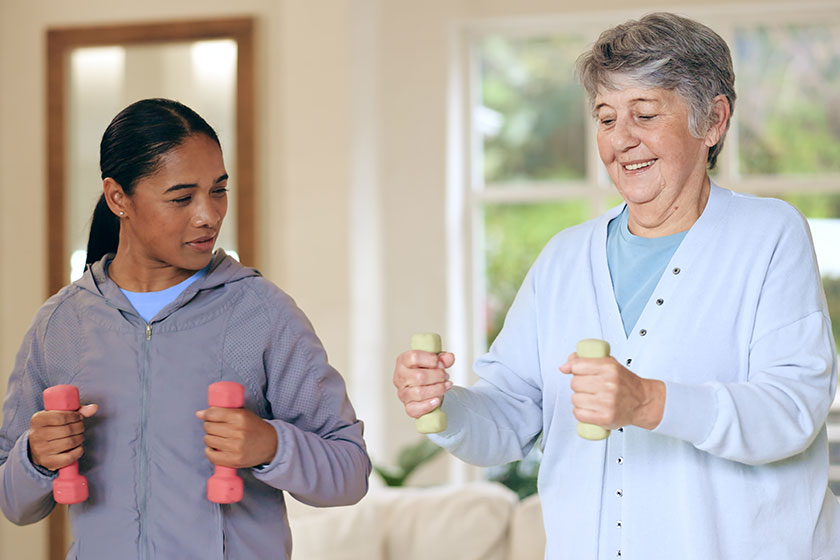How To Help Your Aging Loved Ones Cope With Fears Of Exercising

Aging can bring about concerns or anxieties related to physical activity, often referred to as exercising fears. These fears may arise from various sources, such as the potential for injury, reduced mobility, or feeling overwhelmed by exercise routines. Recognizing and addressing these fears with empathy can play a significant role in helping seniors stay active and maintain their health.
In this article, we’ll discover the common fears seniors face regarding exercise and provide actionable steps you can take to help them overcome these concerns.
Understanding Common Fears of Exercising Among Seniors
Many older adults develop concerns around physical activity for various reasons. Some of the most common fears include:
- Fear of Injury: Seniors may fear falling, pulling a muscle, or straining their joints. This can deter them from starting any exercise routine.
- Fear of Overexertion: They may worry about becoming too tired or overwhelmed by a workout, especially if they haven’t been physically active in some time.
- Uncertainty about Ability: As mobility and strength decline with age, many seniors fear they are no longer capable of engaging in exercise.
- Lack of Knowledge: Not knowing where to begin or how to perform exercises safely can be a barrier to getting started.
Recognizing these fears is the first step toward helping your loved ones feel more comfortable with physical activity.
Addressing and Validating Their Concerns
One of the best ways to help your aging loved ones cope with exercising fears is by addressing their concerns head-on. Start by having an open, empathetic conversation where you listen to their worries without judgment. Acknowledge their fears and offer reassurance that it's normal to feel anxious about exercise, especially if it’s been a while since they’ve been active.
When their concerns are validated, seniors are more likely to feel supported, which can be a powerful motivator to start or continue exercising.
Choosing Safe and Gentle Exercise Options
To reduce the fear of injury, recommend safe and low-impact exercises that cater to their physical capabilities. Activities like walking, swimming, and yoga are excellent choices that allow for gradual progress. Encourage them to start with simple movements and slowly build up their endurance.
- Walking: A gentle, low-impact exercise that can be done almost anywhere.
- Chair Yoga: Offers the benefits of stretching and improving flexibility without putting too much strain on the joints.
- Swimming or Water Aerobics: Water exercises reduce the pressure on joints, making it easier for seniors to move freely.
- Tai Chi: A gentle martial art that focuses on balance and controlled movements, which can help reduce the fear of falling.
The goal is to introduce them to exercises that are manageable and gradually build their confidence.
Start Small and Celebrate Progress
Encouraging your loved ones to start with small, achievable goals can alleviate some of their anxiety. For instance, a simple 10-minute walk a few times a week can make a big difference. Once they feel comfortable, they can gradually increase the duration or intensity of their workouts.
Celebrate each milestone, no matter how small. Positive reinforcement can help boost their confidence and motivation, making it easier to continue with their fitness journey.
Seek Professional Guidance
Sometimes, professional guidance from a physical therapist or certified fitness instructor can make a significant difference. These professionals can design a personalized exercise plan that takes into account any existing health conditions, mobility issues, or other concerns. Having a trained expert can also provide your loved ones with reassurance that they are engaging in safe, appropriate activities.
You may also want to explore senior fitness classes. Many community centers or gyms offer classes specifically designed for older adults, which can make the experience more enjoyable and less intimidating.
The Power of Social Support
Exercising with others can help alleviate fears and make physical activity feel more enjoyable. If possible, encourage your loved ones to join group exercise classes or work out with a friend. Having a support system can reduce feelings of isolation and provide an additional layer of accountability.
If group classes aren’t an option, simply being there as a workout partner can make a big difference. Walks together, shared stretches, or trying new activities as a team can reduce anxiety and create a positive experience.
Monitor Their Health and Comfort
Lastly, it’s important to monitor how your aging loved ones feel during and after exercise. If they express discomfort or experience any unusual symptoms, it’s essential to consult a healthcare professional. Exercise should be a way to improve their health, not cause pain or harm.
Encourage them to listen to their bodies and take breaks when needed. Remind them that the goal is to improve their well-being gradually.
Empowering Seniors to Overcome Exercising Fears
Helping aging loved ones cope with exercising fears requires understanding, empathy, and practical strategies. By addressing their concerns, choosing appropriate activities, and providing ongoing support, you can empower them to stay active and maintain their health. Exercise offers numerous physical and mental health benefits for seniors, and with your guidance, they can overcome their fears and lead a more active lifestyle.
In our retirement community, we are committed to providing a supportive environment where residents can explore safe and gentle exercise options tailored to their abilities. We offer a variety of activities, from group classes to individualized programs, designed to build confidence and encourage a more active lifestyle. Our team is here to help make physical activity an enjoyable and stress-free part of their daily routine. Contact us today to learn more about how we can support you and your loved ones in embracing a healthier, more active lifestyle.
